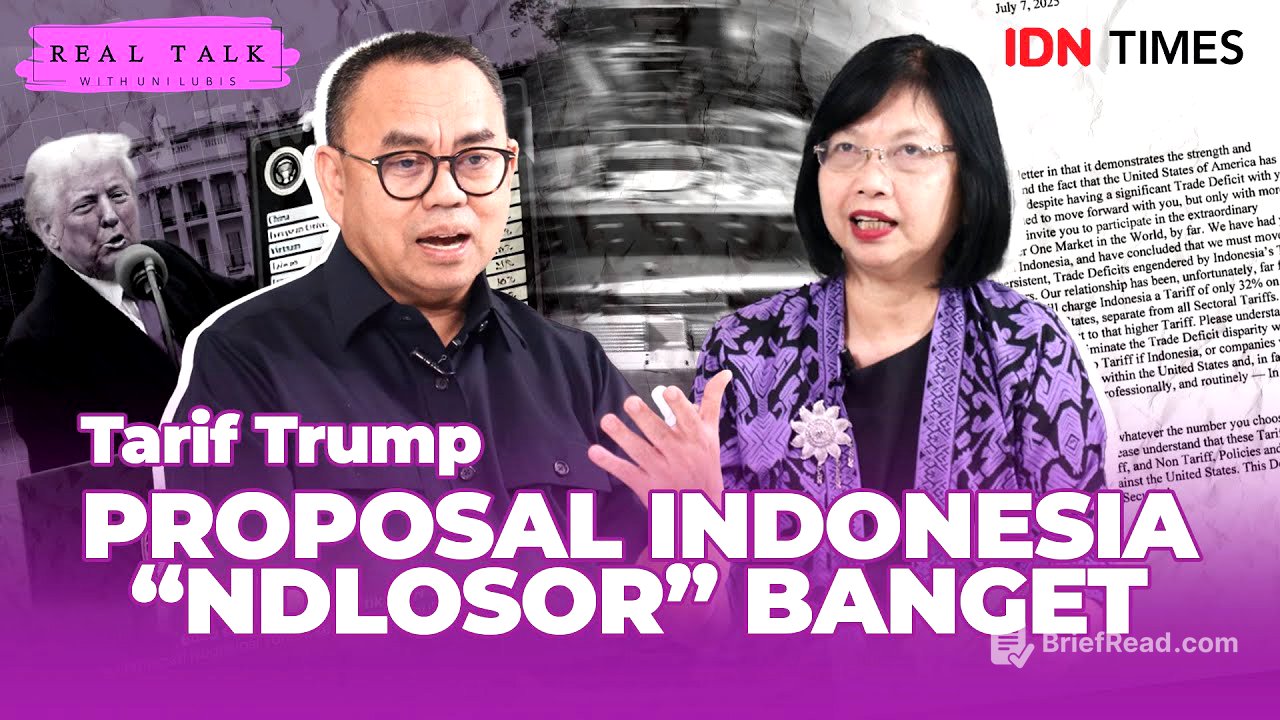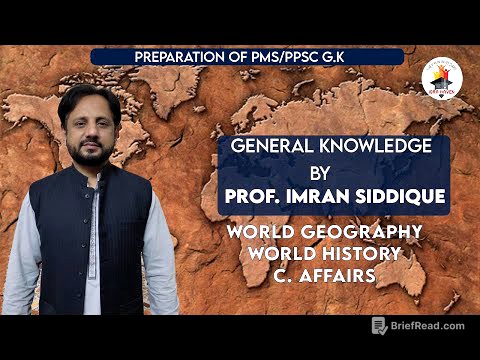TLDR;
This video features a discussion on the implications of potential reciprocal tariffs imposed by the United States on Indonesia, following a "love letter" from then US President Donald Trump. The conversation explores the diplomatic and economic strategies Indonesia might adopt, the importance of strong international relations, and the need to bolster domestic economic resilience.
- Impact of Trump's "love letter" and potential tariffs on Indonesia.
- Strategies for Indonesia to navigate trade negotiations and maintain sovereignty.
- The role of diplomacy and the importance of filling key ambassadorial positions.
- Strengthening domestic economic capacity to mitigate risks from international trade policies.
Introduction [0:01]
The host, Uni Lubis, introduces Sudirman Said, head of the State Hark Institute, to discuss current hot topics, particularly the impact of a "love letter" from then US President Donald Trump regarding reciprocal tariffs. The discussion aims to provide insights into the situation, considering Sudirman Said's background as an anti-corruption activist and former Minister of Energy and Mineral Resources.
Background on the Trade Situation [1:51]
The conversation begins by explaining that President Trump announced reciprocal tariffs to several of America's trading partners to balance the trade deficit. Indonesia has a surplus of $18 billion with the U.S., but Trump is also focused on non-tariff barriers. The host and guest discuss the implications of Trump's approach, which is perceived as a boss-to-subordinate tone, reminiscent of the New Order era when Indonesia signed a letter of intent with the IMF during the 1996 monetary crisis.
Trump's Leadership Style and Impact on Diplomacy [6:38]
Sudirman Said shares his perspective on Trump's leadership style, noting that Trump's approach to international relations is often uncompromising and lacks diplomatic finesse. He suggests that Trump's background as a businessman, who grew linearly in one sector, influences his perception of power as absolute. Despite understanding Trump's character, Sudirman Said emphasizes that Indonesia shouldn't panic, as exports to the U.S. account for 9.9% of total exports and only 2.2% of GDP.
Indonesia's Proposed Trade Offer [9:19]
The discussion shifts to Indonesia's offer to the U.S. to fight for tariff reductions, which includes large-scale imports of energy, food, agriculture, and high-tech products, as well as investments. Sudirman Said expresses concern that these promises might be too generous and could limit Indonesia's flexibility to secure cheaper supplies from other countries. He also points out that investment promises depend on private sector willingness.
Decline in International Diplomacy and Prabowo's Role [11:02]
Sudirman Said observes a decline in Indonesia's international diplomacy during President Jokowi's two terms, noting Jokowi's apparent lack of interest in global affairs. He contrasts this with President Prabowo's active presence in international forums. Sudirman Said stresses the importance of balancing physical presence with substantive concepts and support to ensure confident actions and negotiations.
Analysis of Indonesia's Trade Proposal [12:30]
The host presents graphics detailing Indonesia's proposal, including a total purchase of $34 billion in U.S. products, with $15 billion allocated to energy products handled by Pertamina. Sudirman Said questions the necessity of importing certain types of oil from the U.S., considering the logistical challenges and the availability of cheaper alternatives from OPEC countries. He suggests Pertamina should negotiate based on their needs rather than implementing a state-dictated decision.
Geopolitical Considerations and Diplomacy [18:37]
Sudirman Said highlights that the interests at play may extend beyond commercial aspects to include geopolitical considerations, particularly in the South China Sea. He emphasizes the need for Indonesia to maintain a non-aligned stance, balancing relations with both China and the U.S. He also points out that Vietnam secured a better deal by sending a negotiation team that stayed until a decision was reached, indicating the importance of serious diplomatic engagement.
Importance of Continuous Diplomatic Presence [21:09]
The discussion underscores the significance of continuous diplomatic presence, particularly in important countries like the U.S. The host presents data showing extended periods without an Indonesian ambassador in the U.S., which Sudirman Said views as a sign of not taking the relationship seriously. He stresses that maintaining strong networks and consistent representation is crucial for protecting Indonesia's interests.
Strategies for Navigating Trade Challenges [27:04]
Looking ahead, Sudirman Said advises against panicking and suggests strengthening domestic capacity. This includes building alliances with disappointed countries, strengthening the domestic economy through labor-intensive programs, and fostering a united, resilient citizenry. He also emphasizes the importance of mitigating potential job losses due to declining exports by creating employment opportunities domestically.
Addressing Concerns About Chinese Products [30:11]
The conversation addresses concerns that high tariffs could lead to Indonesia being flooded with Chinese products unable to enter the U.S. Sudirman Said suggests this could be an opportunity to build manufacturing plants in Indonesia. He also notes that American consumers may suffer due to higher prices, and Indonesia should focus on efficient production to minimize the impact of tariffs.
The Role of Networks and Anticipating Trump's Actions [32:43]
The importance of utilizing existing business networks to continue exporting is highlighted, drawing a comparison to Vietnam's successful approach. The guest and host discuss the need to anticipate Trump's actions, given his campaign promises to create jobs and "make America great again." The two-year gap in ambassadorial presence during the transition from Biden to Trump is seen as a missed opportunity to safeguard Indonesia's interests.
Indonesia's Participation in the BRICS Summit [35:51]
The discussion touches on President Prabowo's attendance at the BRICS Summit and Indonesia's official announcement as the 10th member. Sudirman Said suggests this could be viewed in two ways: potentially hardening Trump's stance or being irrelevant if his decision is already made. He emphasizes the importance of supporting Indonesia's free and active diplomacy with substance and clear objectives in both BRICS and relations with the U.S.
Balancing Relationships and Strategic Positioning [38:37]
Sudirman Said shares an example from his time as minister, when he rejoined Indonesia as a member of OPEC to associate with producers, while also pushing for membership in the renewable energy group under the OECD. This illustrates the importance of connecting with various blocs to strengthen Indonesia's position. The host reveals that Indonesia's proposal includes eliminating tariffs on digital products, guaranteeing cross-border data flow, and closer cooperation on economic and national security, including maritime policies in the South China Sea.
Concerns About Sacrificing Sovereignty [41:53]
The host raises concerns about Indonesia potentially sacrificing sovereignty in negotiations, given the strategic elements included in the proposal. Sudirman Said agrees that Indonesia may have lost its bargaining position by being too generous. He suggests anticipating the worst-case scenario and finding solutions to mitigate risks, given Trump's unpredictable nature.
Assessment of the Ambassador Candidate [43:55]
The discussion concludes with an assessment of the ambassador candidate, Indroyono Susilo Sudarman. Sudirman Said disagrees with a comment from a senior friend and describes Mas Indro as a diligent worker, idealist, and academic with long experience and ties to America. He expresses hope that Mas Indro can be a good bridge and that his polite and humble nature will help him navigate relations with the U.S.









